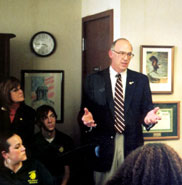Student Senate goes to capital

Rep. Ed Emery (R-Lamar) speaks to Student Senate about House legislation.
JEFFERSON CITY, Mo. – Missouri Southern Student Senate visited the capital Feb. 17. Seventeen of the 40 student senators came to tour Jefferson City.
Adam Griffin, co-adviser to Senate, blamed the low turnout of student senators to the large amount of homework many of them had, as well as Senior Assessment Day Feb. 18.
“Students don’t want to miss a day of class,” Griffin said.
For those who did make the trip, he believed it was a good opportunity for them to see how a real senate works, especially for freshmen student senators.
Griffin said the attendance of student senators to the meetings was generally good, and he believed the small showing at the capital was an adequate representation for Southern.
In 2003, the Senate came to Jefferson City with plans to lobby the Assembly for Southern’s name change.
This year the senators wanted to ask more questions about the House bill introduced by House Speaker Catherine Hanaway (R-Warson Woods) that would ask for $190 million to go toward a life science program at the University of Missouri, as well as additional funding for other regional universities in the state.
In previous years, the student senators have tried and failed to get an audience with the governor.
Despite e-mails, letters and telephone calls, a meeting could not be scheduled for this trip.
Zack Odem, Senate president, said during the past four years he had been on Senate, they had never had the chance to meet with the governor.
However, Rep. Steve Hunter (R-Joplin), Rep. Ron Richard (R-Joplin), Rep. Marilyn Ruestman (R-Joplin), Rep. Bryan Stevenson (R-Webb City), Rep. Kevin Wilson (R-Neosho) and Rep. Ed Emery (R-Lamar) all stepped out of the House session to meet with the student senators.
Emery spoke on the validity of the information currently used in science departments. A House bill exists that would separate science facts from theory and hopefully ensure that they are taught as such.
“Science is science, religion is religion and opinion is opinion,” Emery said. “People teaching sciences do not always like facts.”
Others believed educators should not continue to teach theories as facts.
“Fire them,” Hunter said.
Ruestman said there was a need for interns at the capital, and she was disappointed when she contacted Southern and was told it would not be possible because of a lack of funding.
“This is a way for students to learn about the government first-hand,” Ruestman said.
“And, I want to be able to say my intern is from my school.”
The question was raised as to whether certain departments were working specifically to keep interns from coming to work with the representatives.
All of the representatives urged the students to register to vote and to become active in government.
Student senator Amber Hemphill, junior secondary education and social studies major, said she wondered how much Southern students really cared about what happened at the capital.
“Probably 75 percent don’t know what is going on and don’t care, ” Hemphill said.
“They don’t understand they can do something about it. If you care, come up here and do something.”
Your donation will support the student journalists of Missouri Southern State University. Your contribution will allow us to purchase equipment and cover our annual website hosting costs.



























